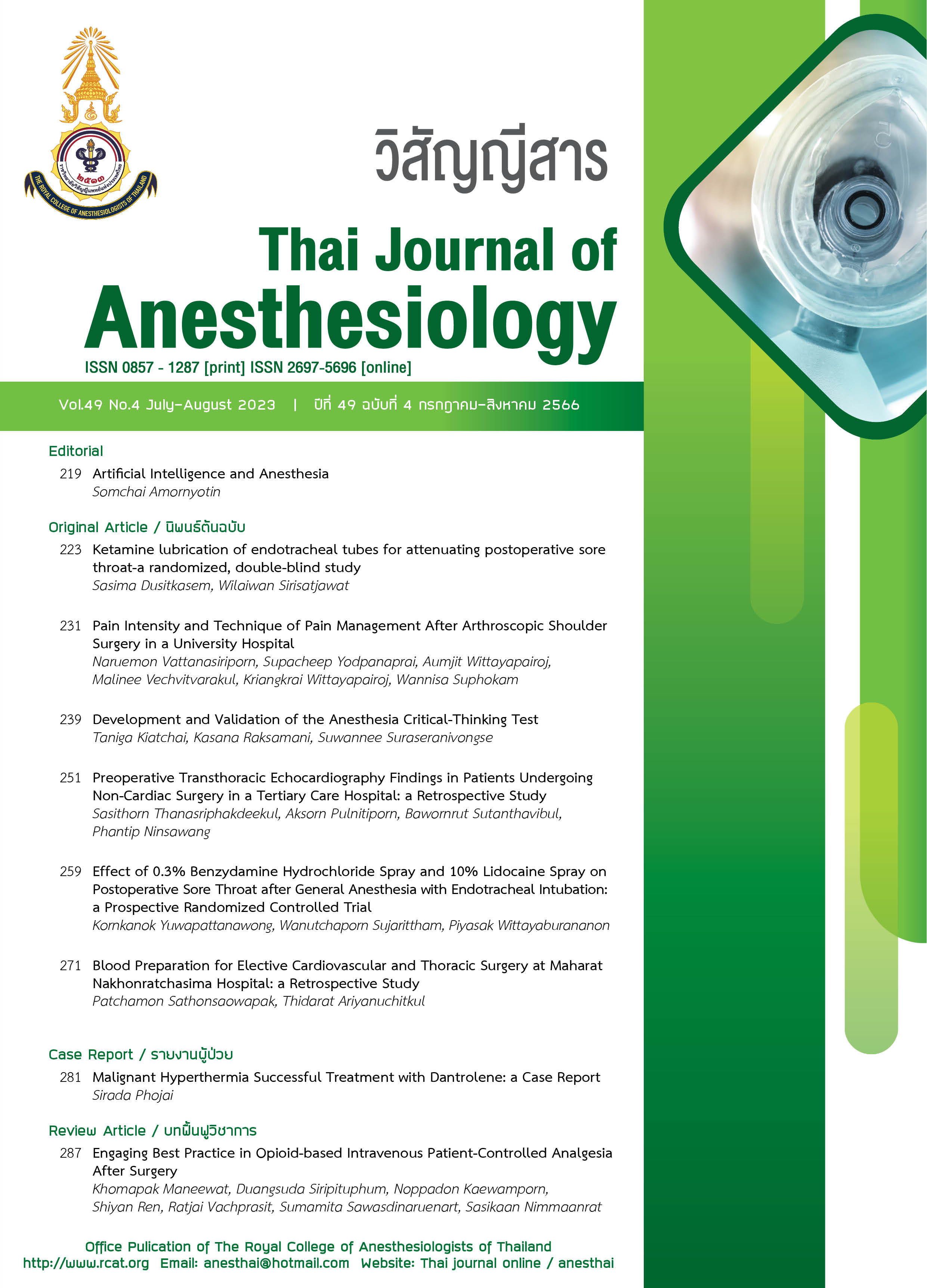ผลของยาฉีดพ่น 0.3% เบนไซดามีน ไฮโดรคลอไรด์ และยาฉีดพ่น 10% ไลโดเคน บนท่อหายใจต่ออาการเจ็บคอหลังการระงับความรู้สึก ด้วยการใส่ท่อหายใจ: การศึกษาไปข้างหน้าแบบสุ่มที่มีตัวควบคุม
Main Article Content
บทคัดย่อ
บทนำ: อาการเจ็บคอหลังการถอดท่อหายใจเป็นภาวะแทรกซ้อนที่พบได้บ่อย ซึ่งส่งผลต่อความพึงพอใจของผู้ป่วย วัตถุประสงค์ของการศึกษาเพื่อศึกษาผลของยาฉีดพ่น 0.3% เบนไซดามีน ไฮโดรคลอไรด์ และยาฉีดพ่น 10% ไลโดเคน ต่ออาการเจ็บคอใน 24 ชั่วโมงแรกหลังผ่าตัด และอุบัติการณ์อาการเสียงแหบ ไอ กลืนลำบาก และคลื่นไส้อาเจียน วิธีการศึกษา: ศึกษาไปข้างหน้าแบบสุ่มที่มีตัวควบคุมในผู้ป่วยจำนวน 165 คน แบ่งออกเป็น 3 กลุ่มคือ กลุ่มยาฉีดพ่น 0.3% เบนไซดามีน ไฮโดรคลอไรด์ กลุ่มยาฉีดพ่น 10% ไลโดเคน และกลุ่มสารละลายนอร์มัล ติดตามอาการเจ็บคอ เสียงแหบ ไอ กลืนลำบาก และคลื่นไส้อาเจียน ที่เวลา 1, 6, 12 และ 24 ชั่วโมงหลังผ่าตัด ผลการศึกษา: ยาฉีดพ่น 0.3% เบนไซดามีน ไฮโดรคลอไรด์ และยาฉีดพ่น 10% ไลโดเคน ช่วยลดอาการ เจ็บคอหลังถอดท่อหายใจในช่วง 24 ชั่วโมงแรกหลังการผ่าตัด แต่ไม่แตกต่างกันทางสถิติระหว่างกลุ่ม พบอาการไอในกลุ่มยาฉีดพ่น 10% ไลโดเคนที่ชั่วโมงที่ 1 (P=0.019) และพบอาการคลื่นไส้อาเจียนในกลุ่มยาฉีดพ่น 0.3% เบนไซดามีน ไฮโดรคลอไรด์ ที่ชั่วโมงที่ 6 หลังการถอดท่อหายใจ (P=0.015) สรุป: ยาฉีดพ่น 0.3% เบนไซดามีน ไฮโดรคลอไรด์ ยาฉีดพ่น 10% ไลโดเคน และสารละลายนอร์มัล สามารถลดอาการเจ็บคอใน 24 ชั่วโมงแรกหลังผ่าตัดหลังถอดท่อหายใจ อย่างไรก็ตามยาฉีดพ่น 0.3% เบนไซดามีน ไฮโดรคลอไรด์ และยาฉีดพ่น 10% ไลโดเคน ไม่สามารถป้องกันอาการเสียงแหบและกลืนลำบากหลังถอดท่อหายใจ
Article Details

อนุญาตภายใต้เงื่อนไข Creative Commons Attribution-NonCommercial-NoDerivatives 4.0 International License.
เอกสารอ้างอิง
Tanaka Y, Nakayama T, Nishimori M, Tsujimura Y, Kawaguchi M, Sato Y. Lidocaine for preventing postoperative sore throat. Cochrane Database Syst Rev. 2015;CD004081.
Agarwal A, Nath SS, Goswami D, Gupta D, Dhiraaj S, Singh PK. An evaluation of the efficacy of aspirin and benzydamine hydrochloride gargle for attenuating postoperative sore throat: a prospective, randomized, single-blind study. Anesth Analg. 2006;103:1001-3.
Jaensson M, Gupta A, Nilsson UG. Risk factors for development of postoperative sore throat and hoarseness after endotracheal intubation in women: a secondary analysis. AANA J. 2012;80(Suppl):S67-73.
Tabari M, Soltani G, Zirak N, Alipour M, Khazaeni K. Comparison of effectiveness of betamethasone gel applied to the tracheal tube and IV dexamethasone on postoperative sore throat: a randomized controlled trial. Iran J Otorhinolaryngol. 2013;
:215-20.
Jaensson M, Olowsson LL, Nilsson U. Endotracheal tube size and sore throat following surgery: a randomized-controlled study. Acta Anaesthesiol Scand. 2010;54:147-53.
Park SH, Han SH, Do SH, Kim JW, Rhee KY, Kim JH. Prophylactic dexamethasone decreases the
incidence of sore throat and hoarseness after tracheal extubation with a double-lumen endobronchial tube. Anesth Analg. 2008;107:1814-8.
Hung NK, Wu CT, Chan SM, et al. Effect on postoperative sore throat of spraying the endo-tracheal tube cuff with benzydamine hydrochloride, 10% lidocaine, and 2% lidocaine. Anesth Analg. 2010;111:882-6.
Rudra A, Ray S, Chatterjee S, Ahmed A, Ghosh S. Gargling with ketamine attenuates the postoperative sore throat. Indian J Anaesth. 2009;53:40-3.
Minogue SC, Ralph J, Lampa MJ. Laryngotracheal topicalization with lidocaine before intubation decreases the incidence of coughing on emergence from general anesthesia. Anesth Analg. 2004;99:1253-7.
Mekhemar NA, El-agwany AS, Radi WK, El-Hady SM. Comparative study between benzydamine hydrochloride gel, lidocaine 5% gel and lidocaine 10% spray on endotracheal tube cuff as regards postoperative sore throat. Rev Bras Anestesiol. 2016;66:242-8.
Agarwal A, Nath SS, Goswami D. An evaluation of the efficacy of aspirin and benzydamine hydrochloride gargle for attenuating postoperative sore throat: a prospective, randomized, single-blind study. Anesth Analg. 2006;103:1001-3.
Navarro LHC, Braz JRC, Nakamura G, Lima RM, Silva FP, Módolo NSP. Effectiveness and safety of endotracheal tube cuffs filled with air versus filled with alkalinized lidocaine: a randomized clinical trial. Sao Paulo Med J. 2007;125:322-8.
Rosner B. Fundamentals of Biostatistics, 5th edition, Duxbury Press, Belmont, 2000.
Chari VR, Paul A. Comparative study to analyze the incidence of sore throat, cough, and hoarseness of voice after general anesthesia withthe use of topical benzydamine hydrochloride and 2% lignocaine gel with placebo. Med J DY Patil Univ. 2016;9:61-5.
Dabbagh A. Postoperative pain management in cardiac surgery. In: Dabbagh A, Esmailian F, Aranki SF, editors. Postoperative critical care for cardiac surgical patients. New York: Springer Heidelberg. 2014;p253-90.


